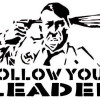How do you deal with being "sure of yourself"?
When questioning your intentions as arrogant, entitled, immature vs confident, moral right, correctness. Or even questioning if the Duning Kruger effect is at play.
What process do you incorporate to back-up your self-judgement or in identifying your decisions/choices are in-fact “correct” in online discussions and/or personal life with friends/family.
How do you remove “self-doubt”?




Add comment